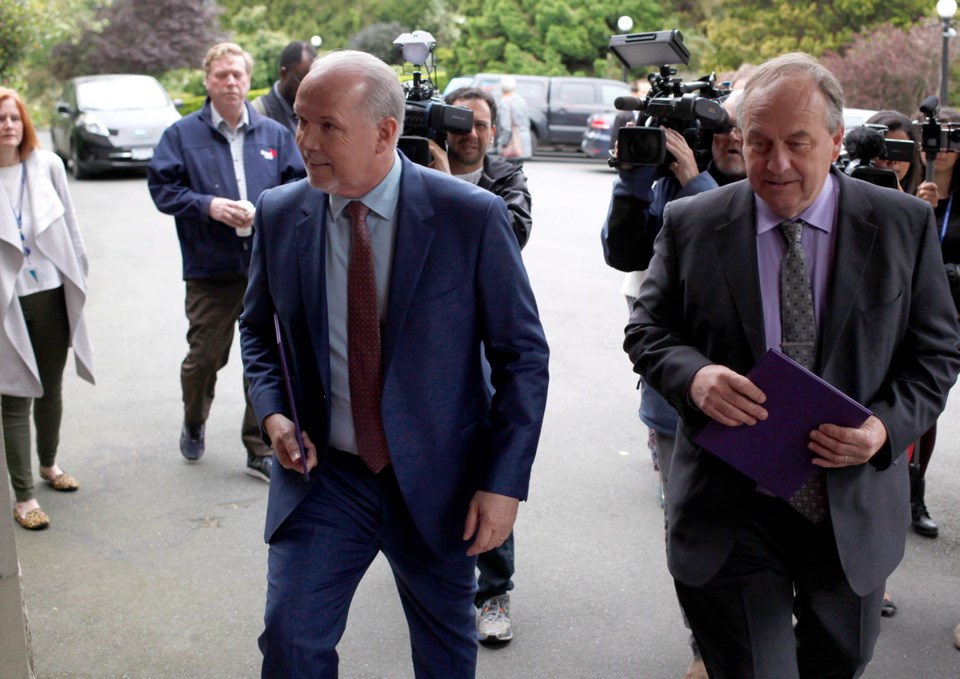NDP Leader John Horgan and Green Leader Andrew Weaver have done four joint public appearances in as many days so far this week.
They’re either getting along well together — or are afraid to let each other out of their sight.
It’s the relationship between the two men and their two parties that will determine whether the confidence-and-supply agreement unveiled Tuesday will amount to anything, should Premier Christy Clark’s government fall.
The long to-do list got all the attention, because it’s so audacious. Hike the carbon tax by two-thirds, hold a referendum in just 18 months on changing the voting system, fight the pipeline, eliminate the MSP — the list runs five pages.
But officials who gave a background briefing on the agreement stressed all those goals depend on the “good faith and no surprises” principle the NDP caucus and the three Green MLAs will have to abide by. It’s obviously critical because, under the terms, a perceived breach of that principle is the only way the Greens can withdraw their promised support for the NDP over a full term in government.
The document has several provisions to enforce co-operation. It’s clear the Greens drove a hard bargain. They get to range through the entire government checking policies. They get access to all deputy ministers and ministry staff briefings.
They get advance notice of all decisions, and guaranteed consultation before all major ones are made. It’s to “ensure Green caucus views can be incorporated into final decision-making.”
Formal consultation would be managed directly from the premier’s office as opposed to a caucus or minister’s office. Regular meetings between the premier and Weaver would be set. The list of situations requiring consultation covers almost everything. It’s not clear how the ceremonial cabinet oath of confidentiality applies.
When drafting a budget, the NDP promises to ensure “meaningful consultation” with the Greens before it is finalized. The NDP government would “gauge support” from the Greens before all bills.
“To ensure the Green caucus is informed … the B.C. NDP government agrees to provide access to key documents and officials.”
Both sides agree to run all news releases and announcements by one another beforehand.
There’s also a dispute-resolution system if disagreements arise.
Greens maintain they will be an independent caucus and it’s not a coalition government. That also works in their favour, as they can just walk away if anything major goes wrong.
Just So You Know: The final count of Election 2017 continues to astound.
It was the closest B.C. contest in history, as measured by the popular vote, the closest in 65 years by seat count, and one of the closest in Canadian history, by any measure. Out of 1.94 million votes across 87 ridings, the difference in the popular vote between the two major parties came down to 1,566 votes. That’s a standing-room-only crowd at Esquimalt’s Archie Browning Sports Centre. The B.C. Liberals came out ahead, by a margin of .08 per cent.
There are campaigners in selected ridings who will spend the rest of their lives playing “what if?” games in their minds. Examples:
• The hapless B.C. Conservative Party, which had no leader and lost its official spokesman to an even smaller party, ran only 10 candidates, and two of them changed history. They ran in the two ridings with the narrowest NDP victory margins. If just over 500 Conservative voters in Courtenay-Comox and Maple Ridge-Mission had voted Liberal instead, the Liberals would have won a clear majority.
• The combined victory margin in the four closest Liberal-won ridings was 1,231 votes. So hypothetically, if the right combination of 616 Liberal voters in those ridings had voted NDP instead, the Opposition would have taken over the legislature on their own terms, with one seat to spare, and no need for any Green support.
• Conversely, the combined victory margin in the two closest NDP-won ridings was 514 votes. So if 95 NDP voters in Courtenay-Comox and 163 in Maple Ridge-Mission had voted Liberal instead, Clark would have a slim but working majority, with enough seats to appoint a Speaker and carry on.
In a province with 4.6 million people, she came within 258 votes of getting re-elected with a clear majority.



